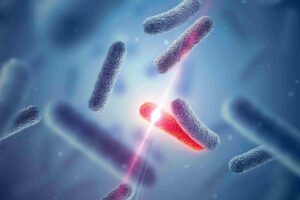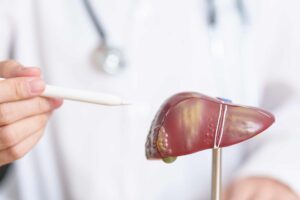• Two lactic acid flavors
• Reducing cell proliferation
What is already known on this topic
Vagina-dwelling microbes, in particular Lactobacilli, are thought to protect women against Chlamydia trachomatis, the etiological agent of one of the most common sexually transmitted infections. But the mechanisms through which the vaginal microbiota elicits resistance to Chlamydia are unclear.What this research adds
By analyzing the vaginal microbiota of 150 women during and after Chlamydia infection, researchers found that Lactobacillus iners, a bacterium commonly found in the vagina, did not optimally protect the cells lining the vagina against chlamydial infection, while Lactobacillus crispatus, another bacterial species frequently found in the vagina, did. These bacteria seem to influence the susceptibility to Chlamydia infection by producing molecules that block C. trachomatis entry into human cells.Conclusions
Understanding the mechanisms through which vaginal bacteria can promote resistance to Chlamydia could lead to new strategies to protect against this and other sexually transmitted infections.
The vaginal microbiota can influence a woman’s susceptibility to Chlamydia infections by blocking the pathogen’s entry into human cells. The finding, published in mBio, could lead to new strategies to protect against Chlamydia and other sexually transmitted infections.
Scientists have known that vagina-dwelling microbes, in particular Lactobacilli, can protect women against Chlamydia trachomatis, the etiological agent of one of the most common sexually transmitted infections. But the mechanisms through which the vaginal microbiota elicits resistance to Chlamydia are unclear.
To study how vaginal bacteria can promote resistance to Chlamydia, Vonetta Edwards and Steven Smith at the University of Maryland, Baltimore, and their colleagues analyzed the vaginal microbiota of 150 women with Chlamydia infection, before and after they were treated with antibiotics.
Two lactic acid flavors
Lactobacillus iners, a bacterium commonly found in the vagina, did not optimally protect the cells lining the vagina against chlamydial infection, while Lactobacillus crispatus, another bacterial species frequently found in the vagina, did.
The researchers found that products from L. crispatus protected vaginal epithelial cells grown in a dish against Chlamydia infection, whereas products from L. iners had a limited effect on infection.
To understand how different Lactobacilli have such different effects on infection, the team looked at the type of lactic acid produced by the two species. Lactic acid can be produced as an L-form or a D-form. Both forms reduce the pH of the vagina, which helps to prevent infections. L. iners produced only the L form (L-lactic acid), while L. crispatus produced both forms, but it produced more D-lactic acid than L-lactic acid. Adding only D-lactic acid to vaginal epithelial cells protected them from Chlamydia infection, as long as the pH was low.
Reducing cell proliferation
Next, the researchers set out to study how the microbiota affected vaginal epithelial cells. By analyzing samples from 16 women obtained over a 10-week period, the team identified small regulatory RNA molecules called microRNAs. The expression of genes regulated by one such microRNA changed depending on whether the cells were exposed to products from L. crispatus or L. iners.
What’s more, vaginal epithelial cells in a dish exposed to products from the different Lactobacilli showed changes in the expression of genes encoding enzymes that modify chromatin structure to alter gene expression. The targets of these enzymes included several genes involved in regulating cell proliferation, which is key for efficient Chlamydia infection. In particular, products from L. crispatus inhibited cell proliferation.
The findings suggest that Lactobacilli that produce D-lactic acid, such as L. crispatus, can reduce vaginal epithelial cell susceptibility to Chlamydia infection by regulating gene expression and cell proliferation, the scientists say. The team now hopes to understand the mechanisms underlying the host response to the vaginal microbiota.











